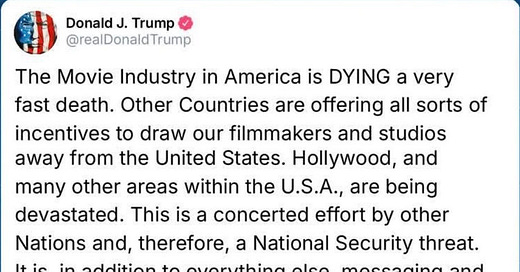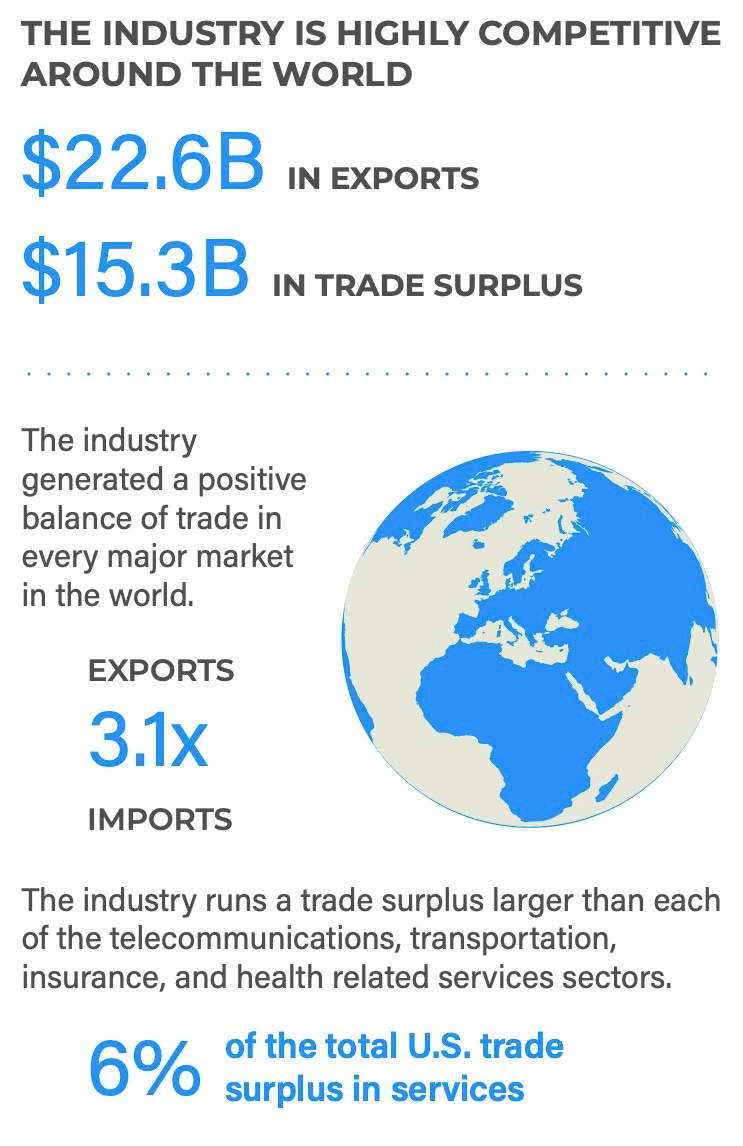President Trump declared a 100% tariff on “Movies coming into our Country that are produced in Foreign Lands” (sic. Trump’s capitalization approximately follows German syntax. Make of that what you will).
This was announced Sunday, May 4 after a Mar-a-Lago meeting with actor Jon Voight, Steven Paul, and media executive Scott Karol.
Over the May 2-4 weekend, the group developed a “comprehensive plan” which Voight later praised in a video while seated in front of an American flag, calling Trump the “greatest president since Abraham Lincoln.”

Following Sunday’s post, Trump claimed that “other nations – a lot of them – have stolen our movie industry, and if they’re not willing to make movies inside the United States then we should have a tariff on movies that come in. It is a very popular thing, I can tell you one thing. Moviemakers love it.”
Aside from the 100% tariff provision in the post, we have no idea what is included in the “comprehensive plan” which has not been made public.
I wish to emphasize this, as we have normalized the formulation of public policy by social media announcement rather than debating it through the legislative process.
The Constitution’s Commerce Clause (above) clearly gives Congress authority over tariffs and international commerce. You may even recall a time not so long ago when industrial policy was subject to Congressional hearings, expert testimony, and public debate.
No more, it seems. Congress does nothing and a supine media acts as obedient scribes. This is further proof, if any such proof was necessary, that the United States is no longer a functioning democracy.
I offer three points.
First, if President Trump successfully claims foreign films represent a “national security threat” then “national security threat” has no meaning. If movies are “national security” then everything is “national security” and falls under his executive emergency authority.
In such a scenario Congress and the judiciary are unnecessary. Their continued existence serves only a performative function, acting out a pantomime of regular democratic order.
This is “façade democracy,” whereby the trappings of a Constitutional republic remain in place while all meaningful authority resides with the unitary executive.
Second, while movie and television production have begun to move away from Los Angeles (70% of all U.S movies are still shot there), the industry is thriving. According to the American Motion Picture And Television Industry (MPA) calculations (above), the industry supports nearly 2.5 million jobs, generates $22.6 billion in exports, and represents 6% of the United States trade surplus in services.
In 2019 The international box office made up over 70% of total revenue, a figure that has only slightly declined in subsequent years. The foreign box office for U.S. movies generated $8.7 billion in 2024.
As we have seen, tariffs are always answered in kind and American movies would be subject to a 100% retaliatory tariff. This will decimate the lucrative foreign markets and encourage video piracy, already a growing problem for Hollywood.
Finally, when is a movie produced in a “foreign land?” There are precious few enterprises that restrict themselves to the boundaries of one particular nation-state and movies are no exception. Does partial shooting in a non-American location constitute “producing” a movie?
What about “Movies” not released in theaters but rather distributed on streaming services to televisions (65% in 2024)? Are television productions subject to the tariff?
The 2024 movie “I’m Still Here” (above) won the 2024 Academy Award For Best International Feature Film. It was produced in Brazil but distributed by a U.S. company (Sony Pictures) to streaming services with a de minimus theatrical release calculated to make it award-eligible. Tariff?
These issues may or may not be discussed in the “comprehensive report” which no one will ever see.
I conclude by noting that as of Monday the White House began walking back the tariff announcement, saying “no final decisions have been made.”
I guess we will have to wait until Scott Baio weighs in.






